In this small town, a new way of caring for older people is bringing hope
Written by Megan Specia

For 12 years after her husband died, Norma Fitzgerald tried to maintain her independence, living alone in an apartment on the outskirts of Hull, in northern England, despite her mobility worsening as she reached her mid-80s.
Then one day in the spring of 2022, she suddenly grew dizzy. Her legs gave out, and she collapsed on her apartment floor, unable to find the strength to get up.
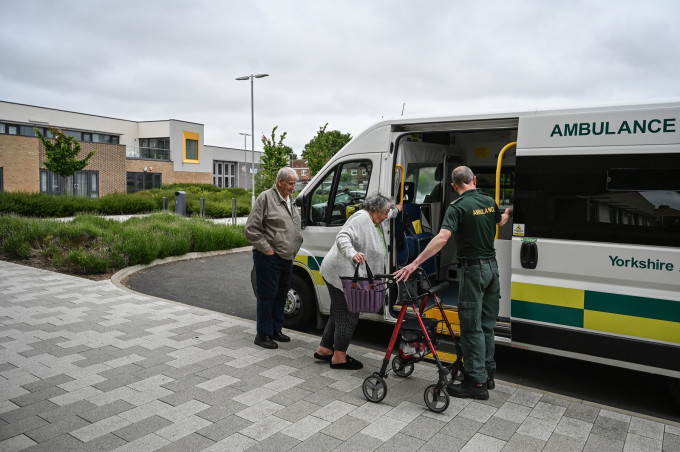 Norma Fitzgerald is helped into an ambulance at the Jean Bishop Integrated Care Center in Hull, England on June 1, 2023. (Mary Turner/The New York Times)
Norma Fitzgerald is helped into an ambulance at the Jean Bishop Integrated Care Center in Hull, England on June 1, 2023. (Mary Turner/The New York Times)
She lay there for two days.
Eventually, a neighbour realised she hadn’t seen her for some time and called an ambulance.
“They had to force the door open,” Fitzgerald, who is now 87, recalled. She was severely dehydrated and spent the next five days in a hospital.
As Britain’s population ages, with almost 19% of the population older than 65, according to the 2021 census, up from 16% a decade before, the needs of an increasingly frail older population are weighing on the country’s health care system.
Along with the National Health Service, many older people also rely on what is known as social care, a mosaic of private and public support that is plagued by chronic staffing shortages, a lack of nursing-home beds and slashed local budgets.
The lack of easily accessible social care, which encompasses everything from home health aides who help with washing and dressing to full-time residential care, means that falls or treatable health conditions can lead to extended hospital stays. That is piling pressure on the NHS, when earlier intervention or home support would have been more appropriate.
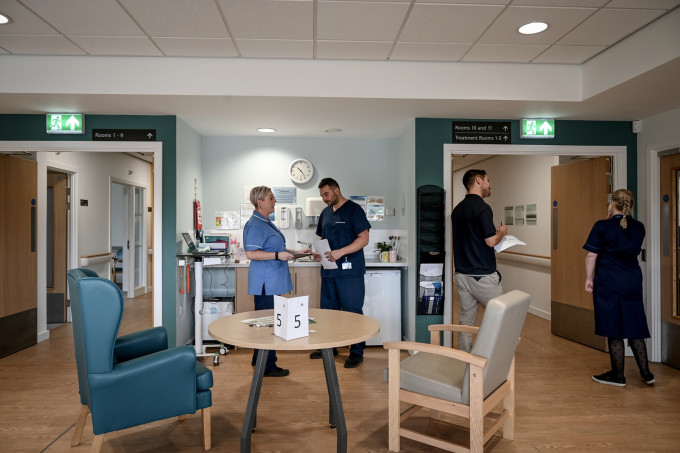 Staff members discuss patient care at a workstation in the Jean Bishop Integrated Care Center in Hull, England on June 1, 2023. (Mary Turner/The New York Times)
Staff members discuss patient care at a workstation in the Jean Bishop Integrated Care Center in Hull, England on June 1, 2023. (Mary Turner/The New York Times)
But what happened to Fitzgerald after she was discharged from the hospital is an example of an approach that could transform the way that older adults living with complex health conditions are cared for, experts say.
In the past, she would probably have been sent home with little continuing care aside from her family doctor. Or she might have had to move into full-time residential care, losing her independence.
Instead, she was referred to the Jean Bishop Integrated Care Center in Hull, a facility that opened five years ago as a one-stop shop for frail older people. The first of its kind in Britain, it brings together doctors, physical therapists, social workers and other professionals under one roof. In the course of a few hours, a patient can see a number of clinicians and have diagnostic tests if needed, including X-rays and blood tests, and receive a personalised care plan — all free of charge.
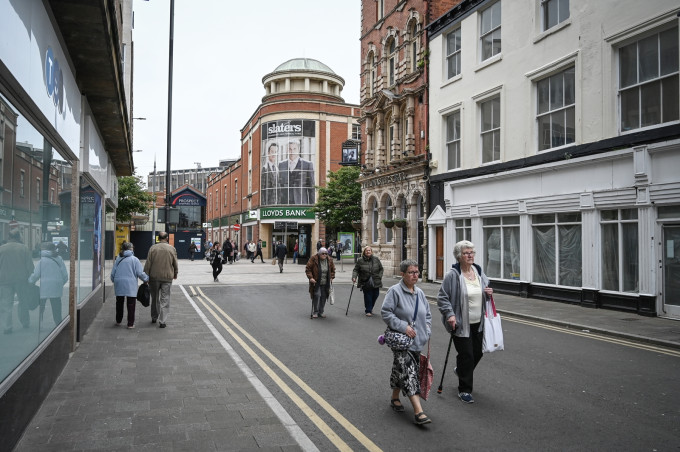 People walk through the center of Hull, England on a busy weekday on May 31, 2023. (Mary Turner/The New York Times)
People walk through the center of Hull, England on a busy weekday on May 31, 2023. (Mary Turner/The New York Times)
On a sunny morning in June, Fitzgerald sat knitting a red-and-gray blanket in the center’s bright and cheerful waiting room. She had been brought by ambulance — all patients are offered transportation if needed — from her assisted-living apartment, to see a doctor specializing in geriatric care, a pharmacist, an occupational therapist and a social worker.
Many geriatric health experts believe this kind of “integrated care,” with a multidisciplinary team addressing all the issues that can affect well-being, from loneliness to immobility, is the future for older people with complex health needs in Britain.
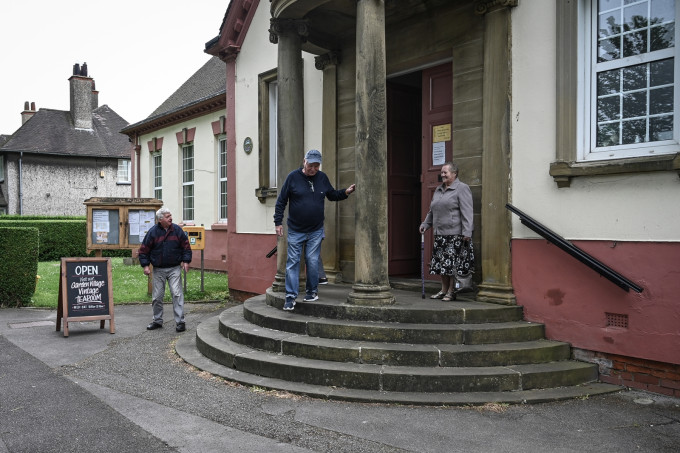 Men and women leave a community center in Hull, England after attending a social group run by the charity Age UK, on May 31, 2023. (Mary Turner/The New York Times)
Men and women leave a community center in Hull, England after attending a social group run by the charity Age UK, on May 31, 2023. (Mary Turner/The New York Times)
Dr. Dan Harman, a geriatrician and one of the center’s clinical leads, sees his job as trying to prevent crisis rather than simply reacting to it, as in Fitzgerald’s case. The center contributed to a 13.6% reduction in emergency room visits and hospital admissions among people older than 80 and a 17.6% drop in ER visits by patients in care homes in the area between 2019 and 2022, according to NHS data.
In the long run, that could lead to substantial savings for the health service and local government, while allowing patients more control over their care.
Integrated services such as this are still rare in Britain, where the social care system is under extraordinary strain. After the 2008 financial crisis, the Conservative-led government oversaw a period of prolonged austerity in which local governments cut spending on social care sharply, leading to a rise in hospital admissions of people older than 65. The pandemic, and recent high inflation, intensified the pressure.
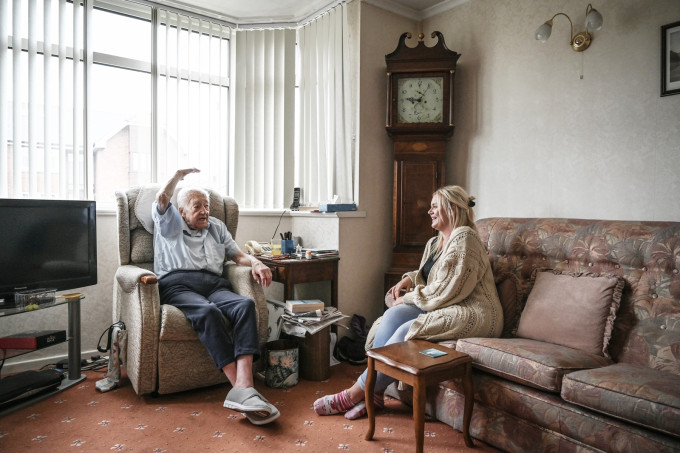 Alan Walker, left, during a social meeting with Lucy Henn, who volunteers for the charity Age UK, in Hull, England on May 30, 2023. (Mary Turner/The New York Times)
Alan Walker, left, during a social meeting with Lucy Henn, who volunteers for the charity Age UK, in Hull, England on May 30, 2023. (Mary Turner/The New York Times)
Unlike the NHS, social care in England, Northern Ireland and Wales is not free for most people and is often hard to navigate (in Scotland it is free for all.) Anyone in England with assets over 23,250 pounds, or about $29,000, must pay for social care themselves or rely on help from family or charities. Many older people say they worry about steep out-of-pocket costs.
The crisis in the sector is not new. In 2011, a government-commissioned independent review, led by economist Andrew Dilnot, declared the system was “not fit for purpose” and urgently in need an overhaul. More than a decade on, the report’s recommendations have gone unheeded, Dilnot said in a recent interview with The New York Times.
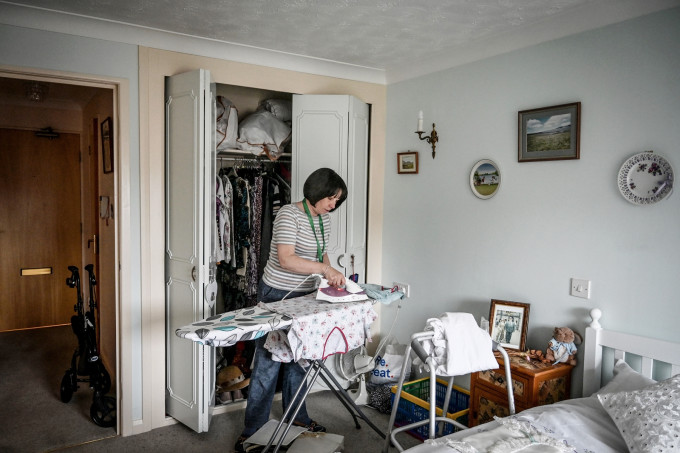 A home care worker, Linda Ryan, from Age UK, visits Mavis Ireland’s home to help with tasks such as ironing and making the bed, which Mavis finds difficult, in Hull, England on June 6, 2023. (Mary Turner/The New York Times)
A home care worker, Linda Ryan, from Age UK, visits Mavis Ireland’s home to help with tasks such as ironing and making the bed, which Mavis finds difficult, in Hull, England on June 6, 2023. (Mary Turner/The New York Times)
For now, charities such as Age UK, a British organisation for older adults that has local affiliates across the country, often step in to fill the gaps. The charity offers services from advice phone lines to home cleaning to community meetups. It also has a befriending service that matches older people with volunteers who visit them weekly.
In October, the lawmaker responsible for social care, Helen Whately, praised the Jean Bishop center and said that the NHS and Age UK were looking at ways to roll out its integrated care model more broadly.
“The future of health care is as much about what happens out of the hospital, as what happens in it,” Whately said.
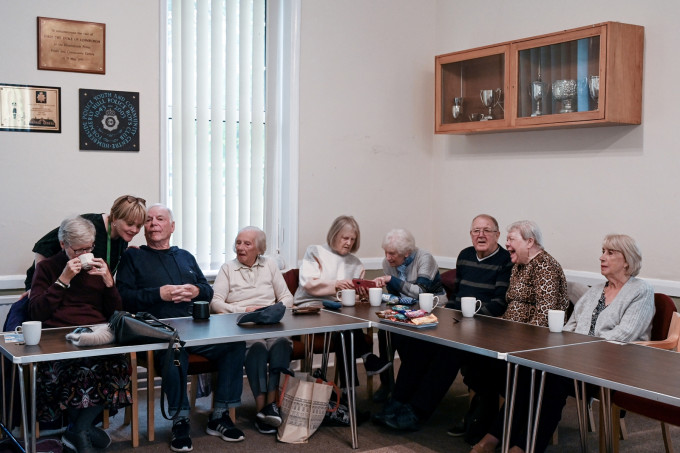 A group of men and women attend a social group run by the charity Age UK, at The Clubhouse Community Center in Hull, England on May 31, 2023. (Mary Turner/The New York Times)
A group of men and women attend a social group run by the charity Age UK, at The Clubhouse Community Center in Hull, England on May 31, 2023. (Mary Turner/The New York Times)
For many seeking care, and for their loved ones, including Emma Gawthorpe, 46, the priority is the present. Her father, Alan Gawthorpe, 72, was diagnosed with Alzheimer’s two years ago. As they waited for his appointments at the Jean Bishop center, she told the Times that the service had made a significant difference after they had struggled to get help in the early months after his diagnosis.
“It was a lot of jumping through a lot of hoops, and you need to be really firm sometimes,” Emma Gawthorpe said. “And unless it’s happening to you, you don’t know anything about it.”
Disclaimer: The copyright of this article belongs to the original author. Reposting this article is solely for the purpose of information dissemination and does not constitute any investment advice. If there is any infringement, please contact us immediately. We will make corrections or deletions as necessary. Thank you.





